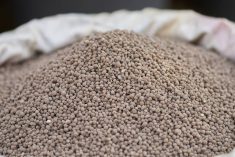Canada’s flax industry group will get an extra $3 million in federal funding for testing to help rid Canada’s flax supply of unwanted Triffid genetics.
Agriculture Minister Gerry Ritz last month pledged the funding from the five-year, $163 million Canadian Agricultural Adaptation Program (CAAP) for the Flax Council of Canada to improve its testing.
“This project will help maintain our access to the (European Union) market for our flax producers and ensure that their products continue to meet the highest industry standards,” Ritz said.
Read Also

Corn market looks bullish; barley has potential
Canadian commodity market analyst makes his predictions on what barley and corn commodities will look in 2026.
The CAAP funding, the government said, will help identify “any remaining genetically modified flax,” a reference to CDC Triffid, a GM flax variety that was bred in Saskatchewan in the 1990s, which was deregistered in 2001 and never commercialized, as the flax industry feared losing access to Europe if a GM flax were introduced.
But several countries closed their ports to Canadian flax in 2009 after a number of samples tested positive for markers of CDC Triffid, which were soon found to have made their way into some breeder seed.
The flax council’s planned testing regime, with CAAP’s backing, is expected to include flax breeder and certified seed sampling, as well as screening of commercial seed stock, rural delivery points, new-crop harvest and farm-saved seeds.
The announcement marks a second round of CAAP funding this year for the flax council, which in February got a pledge of up to $1.9 million to work on its sampling and testing methods for GM flax.














